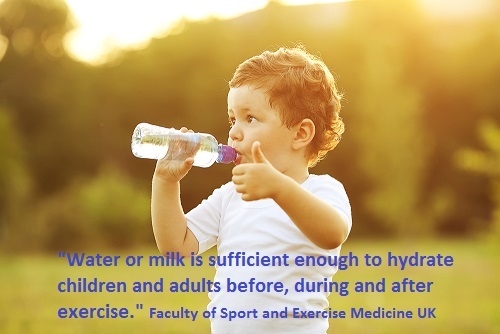FSEM PRESS RELEASE

Regular consumption of sports drinks by children, for social reasons, could be having a detrimental effect on their health concludes the Faculty of Sport and Exercise Medicine (FSEM) UK. A survey by Cardiff University School of Dentistry[i], published in the British Dental Journal, showed a high proportion of 12-14 year olds are regularly consuming, high sugar, sports drinks unnecessarily:
- 89% of school children are consuming sports drinks with 68% drinking them regularly (1-7 times per week)
- Half claimed to drink sports drinks for social reasons
- The high sugar content and low pH of sports drinks increases the risk of obesity, type 2 diabetes, heart disease and the erosion of tooth enamel
- Most sports drinks are purchased by children in local shops at value prices
The survey looked at 160 children in four schools across South Wales and uncovers that children are attracted to sports drinks because of their sweet taste, low price and availability. The research highlights the fact that parents and children are not aware that sports drinks are not intended for consumption by children. The FSEM recommends that water and milk is sufficient enough to hydrate children and adults before during and after exercise, there is no evidence of beneficial effects of sports drinks in non-elite athletes or children. However, there is evidence that an increasing consumption of sugar sweetened drinks in the UK increases cardiometabolic risks[ii] and contributes to tooth decay.
Half of the children surveyed claimed to drink them socially and most (80%) purchased sports drinks in local shops, whilst 90% claimed that taste was a factor and only (18%) claiming to drink them because of the perceived performance enhancing effect. The FSEM is calling for tighter regulation around the, price, availability and marketing of sports drinks to children, especially surrounding the school area, to safeguard general and dental health:
Dr Paul D Jackson, President of the FSEM UK comments: “The proportion of children in this study who consume high carbohydrate drinks, which are designed for sport, in a recreational non-sporting context is of concern.
“Sports drinks are intended for athletes taking part in endurance and intense sporting events, they are also connected with tooth decay in athletes[iii] and should be used following the advice of dental and healthcare teams dedicated to looking after athletes. Water or milk is sufficient enough to hydrate active children, high sugar sports drinks are unnecessary for children and most adults.”
Russ Ladwa, chair of the British Dental Association’s Health and Science Committee said: “The rise of sports drinks as just another soft drink option among children is a real cause for concern, and both parents and government must take note. They are laden with acids and sugars, and could be behind the decay problems we’re now seeing among top footballers[iv].
“Sports drinks are rarely a healthy choice, and marketing them to the general population, and young people in particular, is grossly irresponsible. Elite athletes might have reason to use them, but for almost everyone else they represent a real risk to both their oral and their general health.”
The FSEM is concerned about an increasing UK trend for the consumption of sports drinks[v] and this schools survey uncovers social reasons, availability and price as having a large influencing factor. Price was one of the top three recorded reasons for purchase and, of particular concern, 26% of children also cited leisure centres as purchase sources.
The survey also addresses the fact that there is particular confusion over the definition of a sports versus an energy drink. However from a dental and wider health perspective, these two drinks have similar detrimental effects due to their high sugar content and low pH.
In supermarkets and shops, sports drinks are sold alongside other sugar sweetened beverages. This is misleading children and parents by indicating that they are meant for use by everyone.
Related BSJM Material:
[i] A survey of sports drinks consumption amongst adolescents. Br Dent J 2016; 220: 639-643, D Broughton BDS (Hons) , RM Fairchild BSc (Hons), PhD, MZ Morgan BSc (Hons), PGCE, MPH, MPhil, FFPH. Applied Clinical Research and Public Health, College of Biomedical and Life Sciences, Cardiff University, School of Dentistry, Cardiff Metropolitan University, Department of Healthcare and Food.
[ii] Sweetening of the Global Diet, particularly beverages: patterns, trends, and policy responses. The Lancet Diabetes and Endocrinology volume 4, No.2 p174-186, February 2016, Prof Barry M Popkin, PhD, Prof Corinna Hawkes, PhD.
[iii] Faculty of Sport and Exercise Medicine UK, Position Statement, Oral Health in Sport, October 2014, Professor Ian Needleman
[iv] UCL Eastman Centre for Oral Health and Performance Better Oral Health for Footballers Needed, statement published 3 November 2015. Poor oral health including active caries in 187 UK professional male football players: clinical dental examination performed by dentists, Br J Sports Med 2016;50:41-44 doi:10.1136/bjsports-2015-094953, Professor Ian Needleman et al.
[v] Sales of beverages 2009-2014 in selected countries, data from Euromonitor Passport International, obtained from nutrition fact panels and websites of sugar-sweetened beverage companies kcal = kilocalories, source The Lancet Diabetes & Endocrinology, 2016 4, 174-186DOI: (10.1016/S2213-8587(15)00419-2)